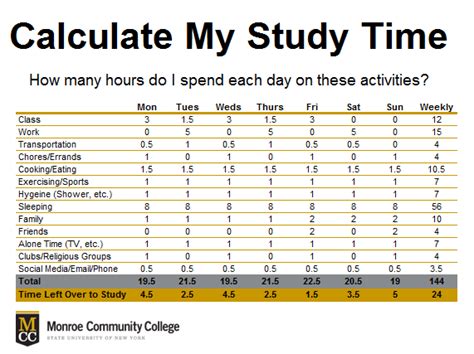Balancing academic responsibilities with work commitments can be a daunting task for students. The amount of time a student spends working each week can vary significantly depending on a number of factors, including their academic workload, financial situation, and personal preferences.

Factors Influencing Student Work Hours
1. Academic Workload
The number of hours a student spends working each week is often influenced by their academic workload. Students who are enrolled in a rigorous academic program may have less time to work than those who are enrolled in a less demanding program.
2. Financial Situation
Financial need can also play a role in determining how many hours a student works each week. Students who need to contribute to their own living expenses or who have other financial obligations may need to work more hours than those who do not.
3. Personal Preferences
Some students simply prefer to work more than others. They may enjoy the extra income or the opportunity to gain work experience. Other students may prefer to focus more on their studies and limit the amount of time they spend working.
Average Number of Hours Students Work
According to a 2019 study by the National Center for Education Statistics, the average number of hours that full-time undergraduate students worked per week during the academic year was 19.3. This number has remained relatively stable in recent years.
Table 1: Average Number of Hours Students Work Per Week
| Student Type | Average Hours Worked Per Week |
|—|—|—|
| Full-time undergraduate | 19.3 |
| Part-time undergraduate | 12.5 |
| Full-time graduate | 16.7 |
| Part-time graduate | 10.2 |
Impact of Working on Student Success
Working while in school can have both positive and negative impacts on student success. On the positive side, working can help students develop valuable skills, such as time management, communication, and teamwork. It can also provide them with financial assistance and help them gain real-world experience.
However, working too many hours can also have negative consequences for student success. Students who work excessive hours may find it difficult to keep up with their coursework and may experience stress, anxiety, and burnout.
Tips for Balancing Work and School
Balancing work and school can be a challenge, but it is possible with careful planning and time management. Here are a few tips for students who are trying to balance work and school:
- Create a schedule and stick to it. Planning out your week in advance will help you make sure that you have enough time for both work and school.
- Prioritize your tasks. Decide which tasks are most important and make sure that you complete those first.
- Take breaks. It is important to take breaks throughout the day, both at work and at school. This will help you stay focused and productive.
- Ask for help. If you are struggling to balance work and school, don’t be afraid to ask for help from your professors, classmates, or family members.
Additional Resources for Students
- National Center for Education Statistics
- American College Health Association
- National Alliance on Mental Illness
